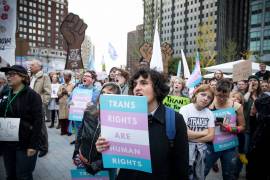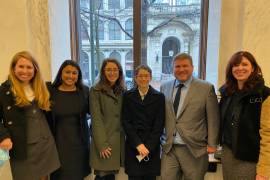
Utah Parenting Case Shines Critical Light on Experiences of LGBT Families in Child Welfare System
Blog Search
For the past three days, the nation has been buzzing about the news that a Utah judge removed an infant from the home of April Hoagland and Beckie Peirce, her foster parents, for no reason other than their sexual orientation.
The national outrage is justified and the attention to the experiences of LGBTQ families and youth in our nation’s child welfare systems way overdue.
Discrimination against LGBTQ youth and families in child welfare systems across the country has scarred a process that purports to place the child’s best interests above all else. The Utah case shows that even judges, who are ethically bound to treat all before them fairly, can allow bias to inform their decisions, even when a child in foster care is on the receiving end.
Rulings like the one made by Judge Johansen point to the need to ensure that LGBT families and LGBTQ children are protected from discrimination in our nation’s child welfare systems. LGBT foster parents are an underutilized resource and they should be welcomed with open arms, especially in light of the dire need for loving, affirming placements for LGBTQ youth, who are overrepresented in the child welfare system.
For almost 15 years, Lambda’s Youth in Out-of-Home Care Project has worked to make child welfare systems safe and equitable for LGBTQ youth and families. At the moment, only a few states in the country have explicit protections against discrimination based on sexual orientation, gender identity and expression in the context of child welfare. We urge the federal government to require those protections nationwide.
In the meantime, we will continue to support the development of LGBTQ-affirming systems through litigation, policy work and training. One critical element of this work is ensuring that all parties involved in the case, especially judges, do not use myths and stereotypes to inform their work, but accurate social science and accepted child welfare practices.
Johansen ordered the removal of the child from Hoagland and Peirce’s care because he erroneously believed that children do better with heterosexual parents. In his initial ruling, the judge stated that “a myriad” of studies exist supporting his claims, although he did not produce any evidence of these studies. No valid studies exist proving this.
Conversely, a host of leading legal, social science and child welfare associations support adoption and foster parenting by same-sex couples. Both the American Sociological Association and the American Psychological Association filed friend-of-the-court briefs in the Obergefell marriage equality case in the Supreme Court, stating that children of same-sex parents fare just as well as children of different-sex parents.
Bias fueled decisions like Johansen’s are an affront to our civil society. Lambda Legal’s Fair Courts Project provides anti-bias education for court systems and promotes individual advocacy on behalf of those who have experienced discrimination in the courts. The Fair Courts Project maintains a state-by-state resource list to help victims of discrimination file a complaint against a judge who has treated them in a discriminatory manner, like Hoagland and Peirce.
Hoagland and Peirce are exactly what many foster children in our nation don’t have enough of – caring, loving families that are willing to provide homes for children who have experienced the trauma of removal from their parents or guardians. Just as we hoped many LGBT families would, they stepped forward after the Obergefell ruling and were welcomed by others in the child welfare system. The child’s biological mother supported the placement, as did her Guardian ad Litem and the Utah Division of Child and Family Services. By all accounts the placement was an excellent fit.
This story may yet have a happy ending. Today the judge reversed his own ruling and a status conference is set for December 4. For now the child will stay with her foster mothers and their family will remain intact. In the meantime, the supportive parties in the case have an important opportunity to educate the judge regarding accurate social science and the overwhelming consensus of child welfare experts.
A child in foster care, who has already been removed from her biological parent, has suffered trauma. To compound that trauma by removing her from a loving foster care placement, because of personal bias and a reliance on junk science, would be simply cruel.




